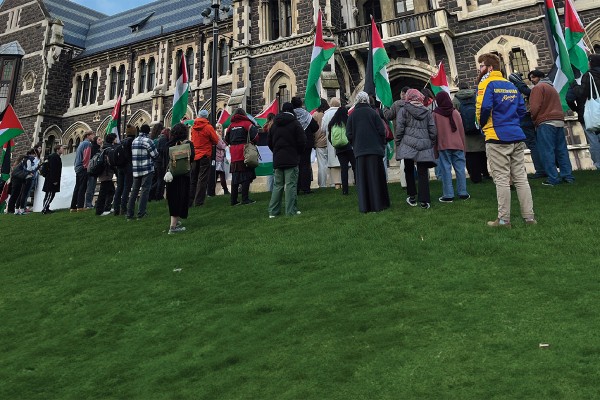A crowd of 100 student protesters marched from Union Lawn to the Clocktower on Tuesday, 30 July, to protest the University of Otago's continued silence on Palestine. Otago Students for Justice in Palestine (OSJP) are demanding the University declare Palestine an “independent and sovereign state,” end any economic ties to Israel, and denounce “all forms of discrimination.” When asked about developments since the first student protest in May, an OSJP organiser told Critic: “Unfortunately, not a lot [has happened], which is why we’re protesting again.”
The second protest of the year follows the refusal of an Official Information Act request by activist John Minto, which inquired whether Otago has financial investments in Israel.
The well-known “ceasefire” chant was adapted by protesters to “What do we want? Disclosure! When do we want it? Now!” Vice-Chancellor Grant Robertson was also targeted in a chant, with protesters calling on him to support boycotts, divestments, and economic sanctions against Israel: “Hey, Grant! We won’t rest until you’re backing BDS!”
Two weeks ago, Critic published a sit-down interview with Robertson, where he was questioned about an open letter signed by staff, students, and alumni. The letter urged the University to “condemn Israel’s attacks on Palestine, urging a call for ceasefire and end to occupation.” Robertson admitted he had not yet seen the letter but emphasised that the “big issue internationally [...] has been universities with investments [...] supporting Israel. That isn't something that the University of Otago has.” In all communications to Critic, the University has denied having investments in Israel “to the best of our knowledge.”
An OSJP organiser, who requested anonymity, criticised Robertson’s response, noting the lack of evidence provided by the Uni. “It’s all well and good to say the reason these [student] movements have happened [...] is because those universities have had financial ties [to Israel] and we don't. But Otago has not produced any evidence. For [Grant Robertson] to say ‘we are not one of those universities,’ it’s like, that would be great. Could you prove it, please?”
Robertson also told Critic that the University’s neutrality stems from the need to "be respectful of the different views that are already present within our community," a position criticised by OSJP organiser Elizabeth Milne. Milne compared Robertson’s stance to a hypothetical situation where Otago University might have refused to condemn South African apartheid in the 1980s because some students or staff supported the regime. “It is a comparable situation because the International Court of Justice ruled that [Israel] is an apartheid state,” Milne told Critic. “New Zealand was vocally against [South Africa’s apartheid regime], and it brought the country together [...] it would be nice to see the same attitude with Palestine.”
Universities across Aotearoa have faced growing pressure from pro-Palestine student movements. After months of protests, Massey University recently issued a statement condemning the act of genocide generally, not in relation to Palestine. The anonymous OSJP organiser told Critic that Massey’s statement was “not good enough.”
“Saying ‘genocide bad’ is an extraordinarily low bar [...] Massey has investments in companies that operate within Israel and arms companies. To say ‘genocide bad’ while not recognising that the genocide is being committed by the [state] they financially support is [...] nothing but lip service. It’s not practical.”
Unlike Massey, the University of Otago has remained steadfast in its institutional neutrality. Vice-Chancellor Grant Robertson stated that Otago will generally only take “political stances” where it is “relevant to the operation of the university.”
While OSJP did not object to describing the Israel-Palestine situation as a “political” issue, organiser Elizabeth Milne stressed it is “first and foremost a humanitarian issue. Politics isn’t, you know, 200 thousand people dying. That’s murder and genocide. That’s a crime. It’s not politics explicitly.”
The Israeli Government claims it is acting in self-defence against Hamas and that civilian harm is “unintentional but lawful.” However, the International Court of Justice has ruled it is “plausible” Israel has committed acts that violate the Genocide Convention and will issue an official decision at a later date. At the time of writing, an estimated 40,039 Palestinians and 1,139 Israelis have been killed since October 7th last year.
Outside the Clocktower, Proctor Dave Scott and several members of Campus Watch observed the protest from a distance. Scott told Critic that he was “non-political in this space” and emphasised that Campus Watch's presence was not a “Big Brother operation,” but to ensure the protest “ran smoothly.” According to Scott, the controversial nature of Israel-Palestine required a heightened focus on protecting student protesters’ safety.
OSJP organisers told Critic that they intend to escalate pressure on Robertson and the University if their silence continues: “This is kind of like the gentle start.”
For an overview of Israel-Palestine from the perspective of local protestors, refer to Issue 4’s feature article ‘From the Museum Lawn to the Octagon: Palestine Will Be Free.’



